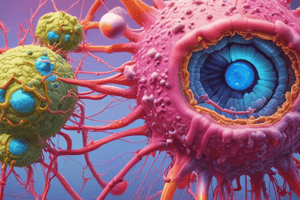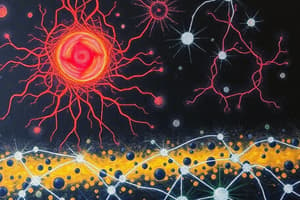Podcast
Questions and Answers
Which of the following describes the plasma membrane?
Which of the following describes the plasma membrane?
- A membrane composed of tiny shelves or cristae
- The phospholipid bilayer surrounding the cell (correct)
- A double layer of protein enclosing the plasma
- A single-layered membrane that surrounds the nucleus of the cell
Which type of cell junction acts as anchors and distributes tension through a cellular sheet and reduces the chance of tearing when subjected to great mechanical stress?
Which type of cell junction acts as anchors and distributes tension through a cellular sheet and reduces the chance of tearing when subjected to great mechanical stress?
- Connexons
- Tight junctions
- Gap junctions
- Desmosomes (correct)
Which of the following is a function of a plasma membrane protein?
Which of the following is a function of a plasma membrane protein?
- Circulating antibody
- Molecular transport through the membrane (correct)
- Forms a lipid bilayer
- Oxygen transport
Which of the following would not be a constituent of a plasma membrane?
Which of the following would not be a constituent of a plasma membrane?
Which of the following is not a factor that binds cells together?
Which of the following is not a factor that binds cells together?
Which of the following is a principle of the fluid mosaic model of cell membrane structure?
Which of the following is a principle of the fluid mosaic model of cell membrane structure?
The glycocalyx is often referred to as the 'cell coat,' which is somewhat fuzzy and sticky with numerous cholesterol chains sticking out from the surface of the cell membrane.
The glycocalyx is often referred to as the 'cell coat,' which is somewhat fuzzy and sticky with numerous cholesterol chains sticking out from the surface of the cell membrane.
What does 'isotonic fluid loss' mean?
What does 'isotonic fluid loss' mean?
A red blood cell placed in pure water would ________.
A red blood cell placed in pure water would ________.
Which of these is not a function of the plasma membrane?
Which of these is not a function of the plasma membrane?
Which of the following statements is correct regarding net diffusion?
Which of the following statements is correct regarding net diffusion?
If cells are placed in a hypertonic solution containing a solute to which the membrane is impermeable, what could happen?
If cells are placed in a hypertonic solution containing a solute to which the membrane is impermeable, what could happen?
Which transport process is the main mechanism for the movement of most macromolecules by body cells?
Which transport process is the main mechanism for the movement of most macromolecules by body cells?
In osmosis, movement of water occurs toward the solution with the lower solute concentration.
In osmosis, movement of water occurs toward the solution with the lower solute concentration.
A process by which large particles may be taken into the cell for food, protection of the body, or for disposing of old or dead cells is called phagocytosis.
A process by which large particles may be taken into the cell for food, protection of the body, or for disposing of old or dead cells is called phagocytosis.
Facilitated diffusion always requires a carrier protein.
Facilitated diffusion always requires a carrier protein.
In their resting state, all body cells exhibit a resting membrane potential ranging from -50 to about +50 millivolts.
In their resting state, all body cells exhibit a resting membrane potential ranging from -50 to about +50 millivolts.
Which of the following is NOT a function of the smooth endoplasmic reticulum?
Which of the following is NOT a function of the smooth endoplasmic reticulum?
Which of the following is NOT a role of cell adhesion molecules?
Which of the following is NOT a role of cell adhesion molecules?
Which of the following statements is most correct regarding the intracellular chemical signals known as 'second messengers'?
Which of the following statements is most correct regarding the intracellular chemical signals known as 'second messengers'?
Why would a patient with paralyzed cilia be at increased risk for a respiratory infection?
Why would a patient with paralyzed cilia be at increased risk for a respiratory infection?
Site of synthesis of lipids and steroid molecules?
Site of synthesis of lipids and steroid molecules?
Produces ATP aerobically?
Produces ATP aerobically?
Site of enzymatic breakdown of phagocytized material?
Site of enzymatic breakdown of phagocytized material?
Forms the mitotic spindle?
Forms the mitotic spindle?
Package proteins for insertion in the cell membrane or exocytosis?
Package proteins for insertion in the cell membrane or exocytosis?
Source of cell autolysis?
Source of cell autolysis?
Replicate for cell division?
Replicate for cell division?
In certain kinds of muscle cells, calcium ions are stored in ________.
In certain kinds of muscle cells, calcium ions are stored in ________.
Which of these is an inclusion, not an organelle?
Which of these is an inclusion, not an organelle?
Mitochondria ________.
Mitochondria ________.
Ribosomes, endoplasmic reticulum, and the Golgi apparatus functionally act in sequence to synthesize and modify proteins for secretory use (export) only, never for use by the cell.
Ribosomes, endoplasmic reticulum, and the Golgi apparatus functionally act in sequence to synthesize and modify proteins for secretory use (export) only, never for use by the cell.
Microfilaments are thin strands of the contractile protein myosin.
Microfilaments are thin strands of the contractile protein myosin.
Interstitial fluid represents one type of extracellular material.
Interstitial fluid represents one type of extracellular material.
There is only one cell type in the human body that has a flagellum.
There is only one cell type in the human body that has a flagellum.
Flashcards are hidden until you start studying
Study Notes
Plasma Membrane and Cell Junctions
- Plasma membrane is composed of a phospholipid bilayer that surrounds the cell.
- Desmosomes are cell junctions that anchor cells and distribute mechanical stress, reducing tearing.
- Functions of plasma membrane proteins include molecular transport through the membrane.
Cell Membrane Composition
- Messenger RNA is not a constituent of the plasma membrane.
- Factors that bind cells include special membrane junctions and glycoproteins in the glycocalyx.
Fluid Mosaic Model
- The fluid mosaic model states that phospholipids form a bilayer that is largely impermeable to water-soluble molecules.
Isotonic Fluid Loss
- Isotonic fluid loss denotes that water and electrolytes are lost in equal proportions.
Effects of Solutions on Cells
- A red blood cell in pure water will swell and may burst.
- In a hypertonic solution, cells will lose water and shrink.
Transport Mechanisms
- The primary process for moving most macromolecules into cells is receptor-mediated endocytosis.
- Facilitated diffusion requires carrier proteins.
Resting Membrane Potential
- Body cells do not generally exhibit a resting membrane potential ranging from -50 to +50 millivolts.
Smooth Endoplasmic Reticulum
- The smooth endoplasmic reticulum is not involved in protein synthesis with ribosomes; its functions include lipid metabolism and steroid hormone synthesis.
Cell Adhesion Molecules
- Functions of cell adhesion molecules include anchoring cells but do not initiate muscle contraction signaling.
Second Messengers
- Second messengers, such as cyclic AMP and calcium, play significant roles in intracellular signaling.
Respiratory Risks
- Paralyzed cilia in respiratory cells increase the risk of infection by allowing mucus and pathogens to remain in the lungs.
Organelle Functions
- Lipid and steroid synthesis occurs in the endoplasmic reticulum.
- Mitochondria produce ATP aerobically and contain their own DNA and RNA necessary for function.
- Lysosomes are involved in the enzymatic breakdown of materials and cell autolysis.
Cell Division and Structure
- Centrioles are responsible for forming the mitotic spindle and replicate during cell division.
Inclusions vs. Organelles
- Melanin is classified as an inclusion, whereas cilia, lysosomes, and microtubules are organelles.
Ribosomes, ER, and Golgi Apparatus
- The ribosomes, endoplasmic reticulum, and Golgi apparatus work together to synthesize and modify proteins, including integral membrane proteins, for both export and internal use.
Contractile Proteins and Microfilaments
- Microfilaments are not merely made of myosin; they are composed of actin.
Extracellular Materials
- Interstitial fluid is a type of extracellular material that surrounds cells.
- There is only one human cell type (sperm) with a flagellum, confirming the uniqueness of this feature.
Studying That Suits You
Use AI to generate personalized quizzes and flashcards to suit your learning preferences.



